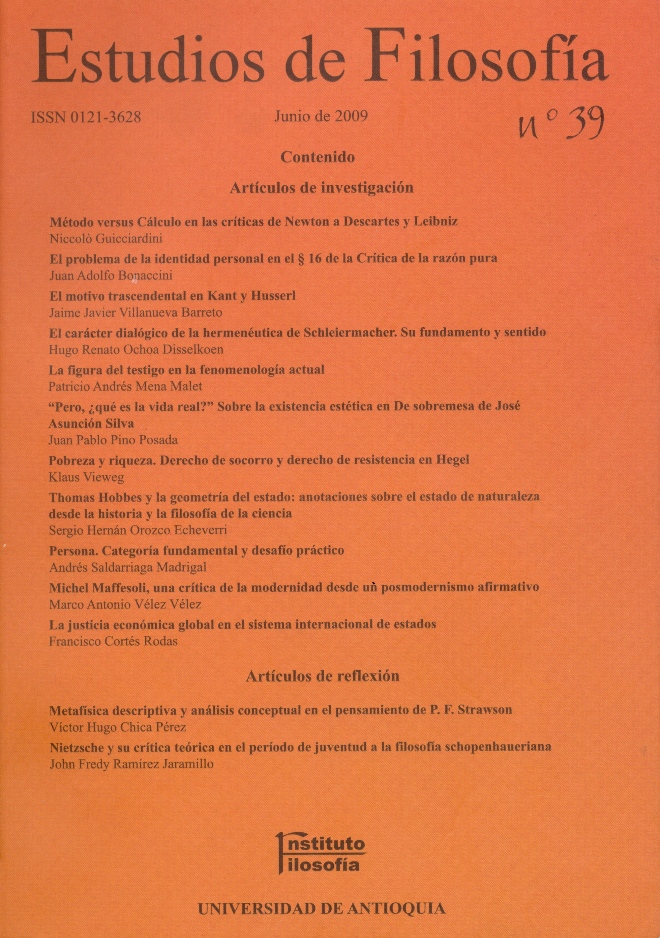Dialogical character of Schleiermacher ́s Hermeneutics. Its basis and its sense
DOI:
https://doi.org/10.17533/udea.ef.12675Keywords:
Hermeneutics, Schleiermacher, Interpretation, Dialogue, SenseAbstract
In general, Contemporary Hermeneutics has sustained the autonomy of the text and Schleiermacher has been reproached for having a perspective which “psychologizes”. However, the purpose of this article is to show that the base of the priority of the “psychological side”, as Schleiermacher calls it, rests on how he conceives interpretation as way of dialogue, insofar as, from his perspective, in every text there is always someone telling something to someone else, independently of whether the interpreter is the original addressee of the text or not.
Downloads
References
DÍAZ, Yasmín del Pilar. “Ciencias de la naturaleza y ciencias del espíritu en la perspectiva de Dilthey”, en: Philosophica, No 30, Valparaíso, II Semestre 2006, pp. 65-76.
DILTHEY, Wilhelm. La esencia de la filosofía. Losada, Buenos Aires, 2003.
FICHTE, J. G. “Acerca del fundamento de nuestra creencia en la Divina Providencia”, en: Philosophica, No 27, Valparaíso, 2004, pp. 393-403.
FIGAL, Günter. Der Sinn des Verstehens. Reclam, Stuttgart, 1996.
GADAMER, H. G. Verdad y método. Sígueme, Salamanca, 1998.
GARALGAZA, Luis. Introducción a la hermenéutica contemporánea. Anthropos, Barcelona, 2002.
GUTIÉRREZ, Carlos Bernardo. “El individuo entre la modernidad y la historia: el problema de la hermenéutica”, en: Villacañas, José Luis (Ed.). La filosofía del siglo XIX. Enciclopedia Iberoamericana de Filosofía. Trotta, Madrid, 2001, pp. 281-302.
HERNÁNDEZ-PACHECO, Javier. Corrientes actuales de filosofía. Tecnos, Madrid, 1996.
KANT, I. Kritik der reinen Vernunft. F. Meiner, Hamburgo, 1956.
MUÑOZ, Jacobo y Faerna, Ángel Manuel (eds.). Caminos de la hermenéutica. Biblioteca Nueva, Madrid, 2006.
OCHOA, Hugo. “O dilema de Schelling”, en: Rey Puente, Fernando & Alves Vieira, Leonardo (eds.) As filosofias de Schelling. Editora UFMG (Universidad Federal de Mina Gerais), Belo Horizonte, 2005, pp. 93- 112.
RICOEUR, Paul. Teoría de la interpretación. Discurso y excedente de sentido. Siglo XXI editores, Madrid, 1995.
SCHELLING, F. W. J. Lecciones muniquesas para la historia de la filosofía moderna. Edinford S.A., Málaga, 1993.
SCHLEIERMACHER, F. D. E. “Acerca del concepto de hermenéutica con referencia a las indicaciones de F. A. Wolf y al manual de Ast”, en: Philosophica, No 31, Valparaíso, I Semestre 2007, pp. 109-124.
SCHLEIERMACHER, F. D. E. Dialektik (1814-1815). Felix Meiner, Hamburg, 1988.
SCHLEIERMACHER, F. D. E. Ethik. Felix Meiner, Hamburg, 1990.
SCHLEIERMACHER, F. D. E. Hermeneutik und Kritik. Suhrkamp, Frankfurt am Main, 1977.
SCHLEIERMACHER, F. D. E. Über die Religion. Reden an die Gebildeten unter ihren Verächtern. Walter de Gruyter, Berlin, 2001. DOI: https://doi.org/10.1515/9783110887280
TUGENDHAT, Ernst. “La fusión de horizontes: un comentario sobre H-G. Gadamer”, en: Tugendhat, Ernst. Ser, verdad, acción. Gedisa, Barcelona, 1997.
Downloads
Published
How to Cite
License
Copyright (c) 2009 Hugo Renato Ochoa Disselkoen

This work is licensed under a Creative Commons Attribution-NonCommercial-ShareAlike 4.0 International License.
Authors who publish with this journal agree to the following terms:
1. The Author retains copyright in the Work, where the term "Work" shall include all digital objects that may result in subsequent electronic publication or distribution.
2. Upon acceptance of the Work, the author shall grant to the Publisher the right of first publication of the Work.
3. The Author shall grant to the Publisher a nonexclusive perpetual right and license to publish, archive, and make accessible the Work in whole or in part in all forms of media now or hereafter known under a Creative Commons Attribution-NoCommercia-ShareAlike (CC BY-NC-SA 4.0), or its equivalent, which, for the avoidance of doubt, allows others to copy, distribute, and transmit the Work under the following conditions: (a) Attribution: Other users must attribute the Work in the manner specified by the author as indicated on the journal Web site;(b) Noncommercial: Other users (including Publisher) may not use this Work for commercial purposes;
4. The Author is able to enter into separate, additional contractual arrangements for the nonexclusive distribution of the journal's published version of the Work (e.g., post it to an institutional repository or publish it in a book), as long as there is provided in the document an acknowledgement of its initial publication in this journal;
5. Authors are permitted, and Estudios de Filosofía promotes, to post online the preprint manuscript of the Work in institutional repositories or on their Websites prior to and during the submission process, as it can lead to productive exchanges, as well as earlier and greater citation of published work (see The Effect of Open Access). Any such posting made before acceptance and publication of the Work is expected be updated upon publication to include a reference to the Estudios de Filosofía's assigned URL to the Article and its final published version in Estudios de Filosofía.















